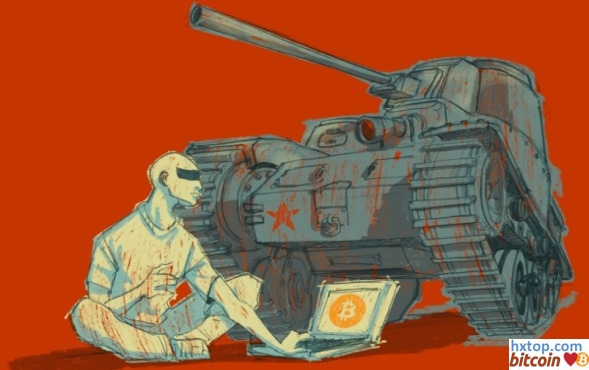Bitcoin可以帮助中国人储蓄?

http://bitcoinmagazine.net网一篇文章中提到在有储蓄习惯的中国,比特币可以帮中国老百姓进行投资储蓄. ====通过Bitcoin投资不仅限于中国。在其他贫穷国家也有,目前是因为缺乏一个良好的投资工具产生了很多的问题,作为现金可以很容易被窃取。bitcoin,从另一方面讲,拥有一个相对较好的储蓄机制,如电脑钱包,Bitcoin服务,可以让你从任何地方访问,只要有一台笔记本电脑和互联网连接的用户名和密码就可以访问和操纵自己的钱。 在中国,Bitcoinica曾试图通过支付宝存款引进Bitcoin,但支付宝的政策不容许外汇交易,迫使Bitcoinica的尝试结束。然而,最近,有一些成功的案例。MemoryDealers的ROGER VER成功的组织了一些中国商人在五月进行了Bitcoin的交流,以帮助使用货币可在澳门进行赌博,本月晚些时候,BTCChina交易成交量也提高了很多。==== 文中大概意思是说在中国这种经济与政治体制下,比特币可以规避很多原有金融体系下的"储蓄"风险,而且很适合中国这种发展中国家与传统观强烈的民族使用它.文章中大量的分析了中国目前的政治体制导致的经济问题.
英文原文: As a recent article by Business Insider describes it, “China is a kleptocracy of a scale never seen before in human history.” The exploitation suffered by hundreds of Chinese families today is not just the exploitation of a heavy-handed government clamping down on union activities, evicting millions from their homes to make way for economic projects, turning a blind eye to outright financial fraud, or any kind of active collusion carried out by foreign businesses; rather, the Chinese are living under a system which has been macroeconomically rigged against them. In traditional Chinese families, the main old age security mechanism for thousands of years has been having children. Because of a culture that leads to children staying with their parents and taking care of them until they die, having a large family was necessary simply because having no family could lead to starvation when everyone your own age has passed away and there is no one left to care for you. When the one-child policy was enacted in 1978, however, this means of taking care of one’s old age became illegal, and low-income families turned to the only other option available to them: savings banks. Even with the level of poverty that is prevalent in China, families are managing to cut back on their consumption to saveas much as 50% of their income every month. Laying aside the one child policy’s effect of pushing savings rates up so high, in an ordinary economy this would simply be the market working as intended. Individuals value their future as much as they do the present, so they save money, and that money is invested into long-term oriented business projects on a societal level. This fuels the economic growth and produces the goods and services that will take care of them in their old age. In China, things are different. Because capital controls prevent most people from investing in foreign assets, the range of places that low and middle income families can save their money is very limited. One option, bank accounts, has rates that are regulated and thus limited to 1%, a highly negative rate when factoring in national inflation, which is currently hovering around 3%. Slightly better are life insurance policies, but the returns on these too are negative when compared with national inflation. The remaining option is property, but the direction in which property values will go in the medium term is uncertain, and the barriers to entry, as well as this risk in property investment, mean that for many savers, banks are actually the more attractive alternative. As for where this savings account money is invested, the chief borrowers are the “state owned enterprises” (SOE), which are not known for their productivity as engines of long term economic growth. As a report by the US-China Economic and Security Review Commission describes, “The irony of this situation is that the private sector in China has been more productive than the state-owned sector and has been growing more rapidly. For example, private enterprises are more than twice as productive as wholly owned SOEs. Indeed, productivity increases with each form of ownership that moves progressively away from direct state-ownership”. Instead, SOEs tend to spend their capital on extravagances such as this palace-like Harbin Pharmaceuticals plant. Nevertheless, the corruption in the Chinese government-industrial complex ensures that these SOEs continue to get favored rates when borrowing money from the banks. The obvious question is, how can Bitcoin help? While the currency is not a panacea in improving investment access and liquidity – for Prosper-like peer lending, for example, it currently has no place whatsoever - this may be an application where Bitcoin may indeed help people protect their wealth. An argument has been made that electronic money and a modern banking system are key tools in alleviating poverty since they allow savings to be kept safe from crime, encouraging people to actually store enough money away for investment or insurance purposes rather than spend it as soon as they can. In China, this is clearly not working. Although banks can protect your wealth from the common crook on the street, they offer no protection against the kleptocrats on the top, who control the banking system itself. It would, of course, be foolish to suggest that people with no children and no welfare system should place the majority of their life savings into a currency which may rise or fall by a factor of a hundred over the next few years. However, Bitcoin offers much more than just the currency itself. First of all, it offers a route for people to store their money in other currencies through exchanges. Second, there have been funds on the GLBSE in the past which allowed people to indirectly own stocks on real-world exchanges, and if demand arises, these may appear again in the future. Such funds can even be based on businesses within China itself, as the private sector is already willing to rely on “private financing mechanisms beyond the scope of permissible financial activity” and more efficient mechanisms of bringing private financing to the businesses that need it most can only be an improvement. Bitcoin is simply one link, even if a critical one, in the chain of personal and economic liberation and democratization that the internet is rapidly beginning to provide. Third, even the highly speculative investment that is Bitcoin itself can be a good thing to have if one puts only a small portion of his savings into it. If Bitcoin falls by a factor of 100, 1% of your life savings would dwindle down to 0.01%, but if it rises by a factor of 100 that 1% could turn into a doubling. The utility of investing through Bitcoin is not limited to China. In other poor countries as well, the lack of a good investment vehicle is a problem for many, as cash can easily be stolen and property destroyed. Bitcoin, on the other hand, features savings mechanisms such as brain wallets, and Bitcoin services can be accessed with a username and password that can also be memorized and accessed from anywhere where there is a laptop and an internet connection. Infrastructure to facilitate much of this, such as text-based mobile phone interfaces, is lacking, but there have been attempts to promote Bitcoin in Africa, and if demand picks up, the infrastructure will be soon to come. In China, Bitcoinica tried to introduce Bitcoin through Alipay deposits in February, but Alipay’s policy of not allowing currency exchange transactions forced this to end. More recently, however, there have been some successes. MemoryDealers’ Roger Ver successfully introduced some Chinese businessmen to Bitcoin in May to help get the currency used for gambling in Macau, and later that month, the BTCChina exchange saw a one-day volume so high as to temporarily propel it to second place among all Bitcoin exchanges in the world. In circumstances like these, Bitcoin should be seen not so much as a technology of economic efficiency, but rather one of democratization. The present, heavily state-controlled banking system is clearly not working for the people, and there is an opportunity for disintermediation to bring costs down for businesses, while at the same time ensuring that working class individuals are not quietly robbed of their savings. Furthermore, if Bitcoin gets any traction as a means of opening up access to capital, the result would be an emerging economy equipped right from the start to use it as a currency. |



 网友评论
网友评论


 @好耶网络
Processed In:-1.6406-Seconds, CMS-52Queries-Amazon Web Services
@好耶网络
Processed In:-1.6406-Seconds, CMS-52Queries-Amazon Web Services












 您的位置:
您的位置: 【】
【】

 [上两篇]
[上两篇]